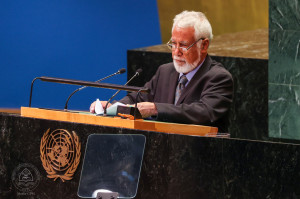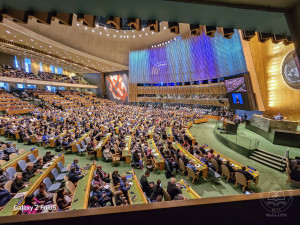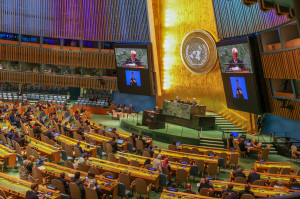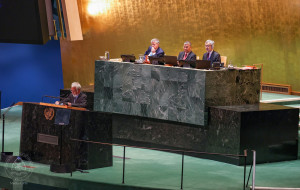Prime Minister Defends Need for Solutions for Vulnerable Countries and Structural Reform of the Security Council

On september 22nd 2024, the Prime Minister, Kay Rala Xanana Gusmão, took part in the Future Summit, held at the United Nations Headquarters in New York, where he gave an incisive speech on the need to strengthen global peace and reform the multilateral system. The event took place on the sidelines of the 79th UN General Assembly and was attended by leaders from dozen of countries. 
In his speech, the Prime Minister emphasized the Timor-Leste’s independence role as a triumph not only for the timorese people, but also for the international system, stressing that Timor-Leste’s independence was an achievement for the timorese people, but also a triumph for the international system’. 
Addressing global challenges, Kay Rala Xanana Gusmão warned of the growing disparity between rich and poor countries, criticising the lack of multilateral solutions to ensure peace in various regions of the world. ‘the International Community has not yet found multilateral solutions for a peaceful future for many nations of the world – from Palestine to Ukraine, from Yemen to Sudan, from the Central African Republic to the Democratic Republic of Congo, from Afghanistan to Myanmar, and from Haiti to so many fragile and conflicted countries’, he said. 
The Prime Minister also emphasized the need for structural reform of the UN Security Council, describing it as “obselete, ineffective and unrepresentative of reality” and defended the need to ‘enlarge the permanent members of the Security Council in order to be more representative and legitimate-geographically, culturally and economically’. The Head of Government also added that ‘an international organsation is only credible if it responds to current needs and doesn’t close itself off in mechanism created to deal with problems from almost 80 years ago’.
In the context of sustainable development, the timorese leader emphasized the essential role of education in promoting peace and long-term prosperity. “we know that without peace there are no conditions for development. That’s why investing in the education of our young people is the best investment for sustainable development and peace’, he said.
In closing his speech, Xanana Gusmão, launched a global appeal for the promotion of the pact for the future, emphasising that the international community must join forces to face current and future global challenges. ‘a pact for the future is urgently needed – a reform pact which looks to the future based on the global challenges of the present, and that renews the confidence of all, particularly the new generation that will realise it’, he concluded.
The Future Summit was marked by the approval of the Pact for the Future and its annexes – the Global Digital Compact and the Declaration on the Future Generations – historic documents aimed at strengthening multilateralism and tackling global crisis such as climate change, artificial intelligence and poverty. António Guterres, Secretary- General of the United Nations, welcomed the adoption of the Pact, saying that it ‘rescues multilateralism from the abyss’ and opens ‘paths to new possibilities and opportunities’ for internatinal cooperation.










































